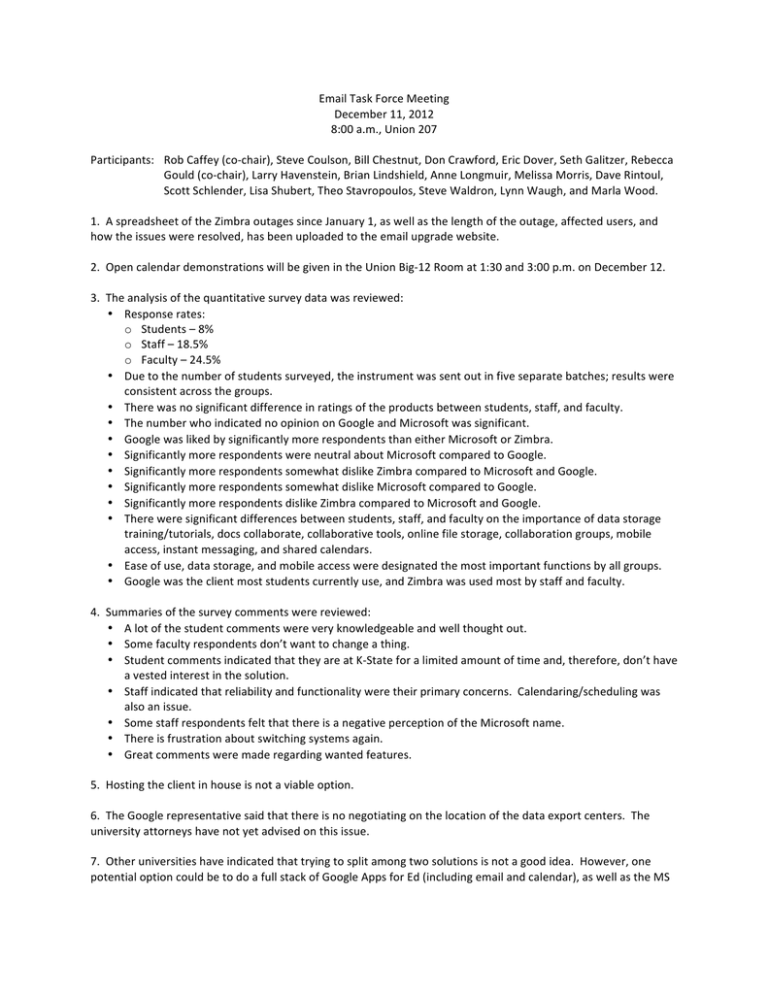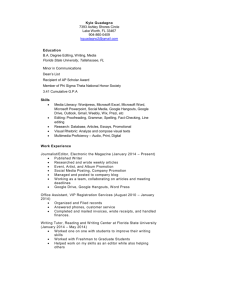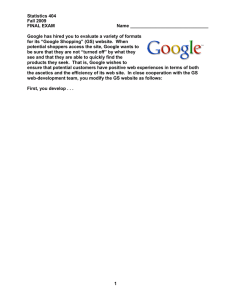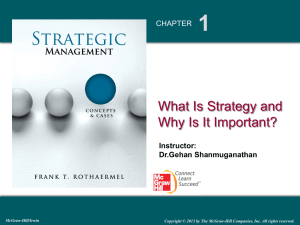Document 13222792
advertisement

Email Task Force Meeting December 11, 2012 8:00 a.m., Union 207 Participants: Rob Caffey (co-­‐chair), Steve Coulson, Bill Chestnut, Don Crawford, Eric Dover, Seth Galitzer, Rebecca Gould (co-­‐chair), Larry Havenstein, Brian Lindshield, Anne Longmuir, Melissa Morris, Dave Rintoul, Scott Schlender, Lisa Shubert, Theo Stavropoulos, Steve Waldron, Lynn Waugh, and Marla Wood. 1. A spreadsheet of the Zimbra outages since January 1, as well as the length of the outage, affected users, and how the issues were resolved, has been uploaded to the email upgrade website. 2. Open calendar demonstrations will be given in the Union Big-­‐12 Room at 1:30 and 3:00 p.m. on December 12. 3. The analysis of the quantitative survey data was reviewed: • Response rates: o Students – 8% o Staff – 18.5% o Faculty – 24.5% • Due to the number of students surveyed, the instrument was sent out in five separate batches; results were consistent across the groups. • There was no significant difference in ratings of the products between students, staff, and faculty. • The number who indicated no opinion on Google and Microsoft was significant. • Google was liked by significantly more respondents than either Microsoft or Zimbra. • Significantly more respondents were neutral about Microsoft compared to Google. • Significantly more respondents somewhat dislike Zimbra compared to Microsoft and Google. • Significantly more respondents somewhat dislike Microsoft compared to Google. • Significantly more respondents dislike Zimbra compared to Microsoft and Google. • There were significant differences between students, staff, and faculty on the importance of data storage training/tutorials, docs collaborate, collaborative tools, online file storage, collaboration groups, mobile access, instant messaging, and shared calendars. • Ease of use, data storage, and mobile access were designated the most important functions by all groups. • Google was the client most students currently use, and Zimbra was used most by staff and faculty. 4. Summaries of the survey comments were reviewed: • A lot of the student comments were very knowledgeable and well thought out. • Some faculty respondents don’t want to change a thing. • Student comments indicated that they are at K-­‐State for a limited amount of time and, therefore, don’t have a vested interest in the solution. • Staff indicated that reliability and functionality were their primary concerns. Calendaring/scheduling was also an issue. • Some staff respondents felt that there is a negative perception of the Microsoft name. • There is frustration about switching systems again. • Great comments were made regarding wanted features. 5. Hosting the client in house is not a viable option. 6. The Google representative said that there is no negotiating on the location of the data export centers. The university attorneys have not yet advised on this issue. 7. Other universities have indicated that trying to split among two solutions is not a good idea. However, one potential option could be to do a full stack of Google Apps for Ed (including email and calendar), as well as the MS stack of applications without email and calendar, or some other combination of the two. Calendaring and email solutions must come from the same source. Rob will look into the feasibility of combining solutions. 8. Some of the formatting gets lost in the translation when Microsoft documents are shared in Google. 9. Email and calendaring are the task force’s highest priorities. 10. Using tags instead of folders is problematic for staff. 11. Staying with Zimbra could be a viable option if a reliable host was found; however, the companies contacted are not interested in hosting Zimbra for the university because of its large number of users. 12. Vet Med, Physics, and Math all have their own systems. Converting to a different solution won’t add any new orphan systems, and Vet Med will use Microsoft Live 365 regardless of the final decision. 13. The report will include: • Quantitative summary (in the appendices) • Summary of comments (in the appendices) • Link to the comments and the survey results • Viable options, coupled with their pros and cons 14. Rebecca will update the draft report and the committee will edit. The edited report will be distributed to the group for further review and comment. The final report will be provided to Ken prior to the next meeting. 15. Ken will be invited to the December 18 meeting to discuss the report. 16. Ken, the Provost and the President will make the final decision. 17. Melissa and Rebecca will draft a statement for the website on why the survey was given, the timing of the survey, and the questions asked. A link to the survey responses will be provided. 18. Action items: • Update/edit draft report – Rebecca • Check on feasibility of providing a hybrid option – Rob • Draft website statement on the survey – Melissa and Rebecca • Move meeting to Hale 301 or 401 – Eric 19. The next meeting is scheduled at 8:00 a.m. on December 18 in Union 207. Eric will try to move the meeting to either Hale 301 or 401.



